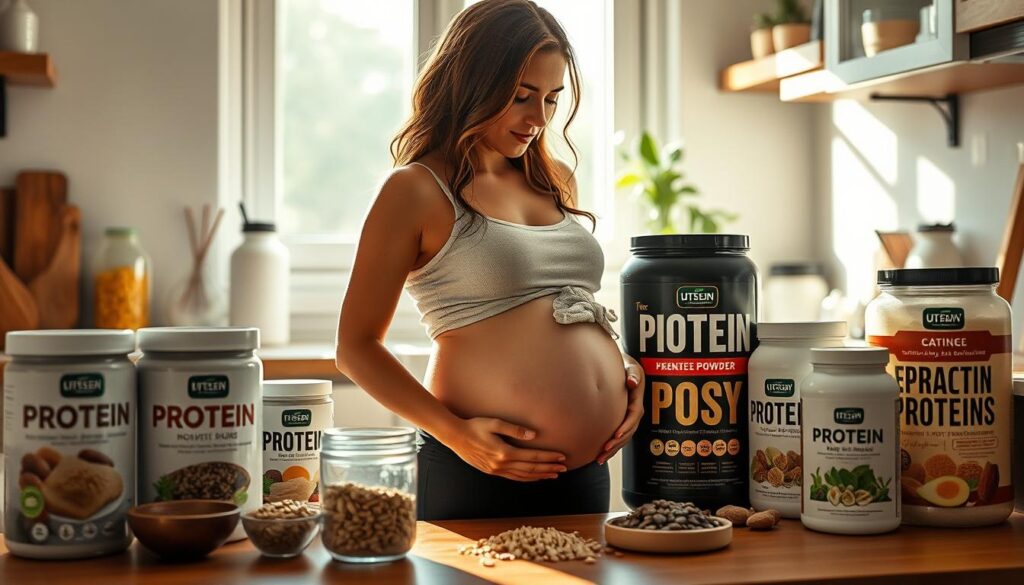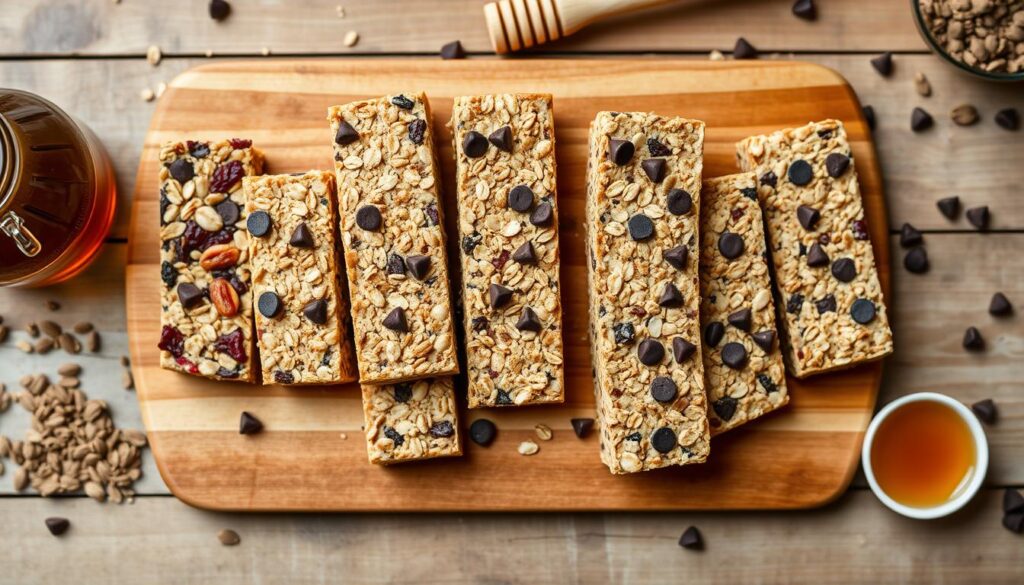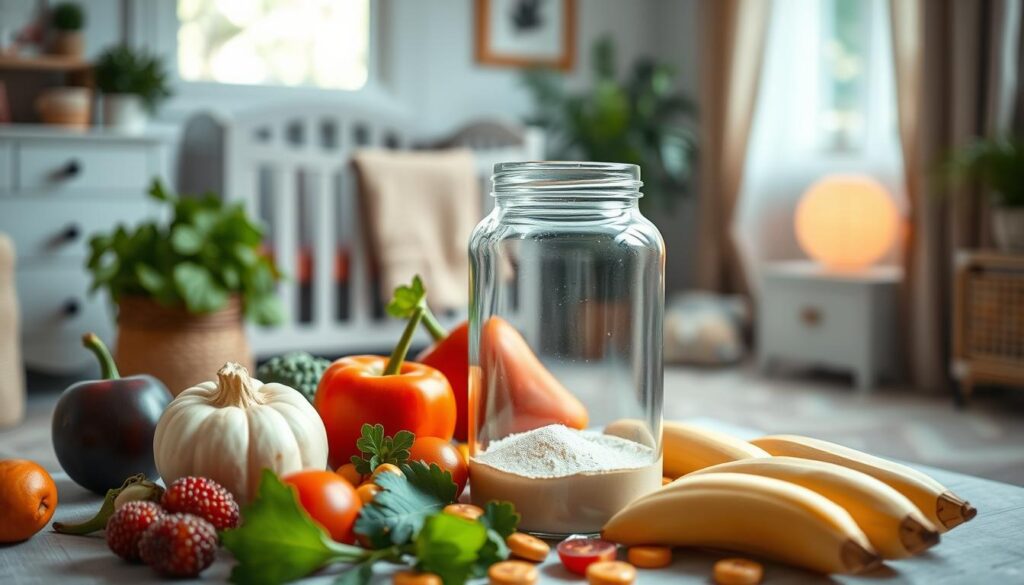Is it safe to use protein powder during pregnancy? With all the info on prenatal nutrition and supplements, it’s hard to know what’s best. Protein is key for your baby’s growth, but how much do you need? And can protein powders help you get enough?
Pregnant women need 70 to 100 grams of protein daily, based on their weight. A diet full of protein-rich foods like lean meats and legumes is best. But, some women might find it hard to get enough protein because of nausea or dietary limits. In these cases, protein powders might seem like a good option. Yet, it’s important to know the risks and benefits before adding them to your diet.
Key Takeaways
- Pregnant women require 70-100 grams of protein per day, depending on body weight
- Protein is crucial for fetal growth and development
- Protein powders can provide a concentrated source of protein, but may also contain added sugars and other ingredients
- High-protein, low-carbohydrate diets during pregnancy may increase the risk of gestational diabetes
- Consult with your healthcare provider before using protein powders during pregnancy
Table of Contents
Why Protein is Important During Pregnancy
Protein is key for the fetus’s growth and development during pregnancy. It’s the second most common thing in our bodies after water. It helps build and fix tissues, makes hormones and enzymes, and carries oxygen in the blood. Eating enough protein can lower the risk of preeclampsia, early birth, and help the baby be a healthy weight.
Protein's Role in Fetal Growth and Development
Right after conception, our body starts making more protein for the growing fetus. The placenta needs protein to help the baby grow. The fetus gets amino acids from the mother through the placenta. These amino acids are vital for the baby’s growth.
Studies show that pregnant women who get more protein can have babies that weigh more. They can also be taller and have a lower risk of being underweight. This is because protein helps the baby grow fast.
Maternal Protein Requirements
During pregnancy, a woman’s body needs more protein. This is to help her blood volume grow and her tissues expand. The recommended amount of protein is 0.75g per kg of body weight per day, plus 6g extra for pregnant women. It’s best to slowly increase protein intake as the pregnancy goes on.
| Region | Percentage of Low Birth Weight Infants |
|---|---|
| Middle East/North Africa | 15% |
| Sub-Saharan Africa | 14% |
| South Asia | 31% |
| India | 40% (of all low birth weight babies in the developing world) |
Women who get more than 2,920 kJ (700 kcal) of supplements and up to 25% protein can have healthier babies. Babies born to these women are often heavier and longer. This shows the importance of protein for a baby’s health.
To support fetal growth and meet maternal protein requirements, focus on pregnancy nutrition. Eat a balanced diet with lots of protein from lean meats, fish, eggs, dairy, legumes, and nuts. Remember to also get enough vitamins and minerals for a healthy pregnancy and baby.
Recommended Daily Protein Intake for Pregnant Women
Protein is key for a healthy pregnancy diet. It helps the baby grow and develop. The amount of protein needed changes based on body weight, activity level, and the stage of pregnancy. Studies say pregnant women need about 38 g/day in the first trimester and 59 g/day in the second and third.
The current RDA for protein in the first trimester is 46 g/day. It goes up to 71 g/day in the second and third trimesters. But, research shows these amounts might not be enough. Protein needs are 39% higher in early pregnancy and 73% higher in late pregnancy than thought before.
A study in the U.S. found many pregnant women don’t get enough protein, especially in the second and third trimesters. On average, they consume 81.9 g/day of protein. Most of this comes from animal sources, making up about 66% of their protein.
| Trimester | Mean Usual Intake (g/day) | Prevalence of Intake Below EAR |
|---|---|---|
| First | 88 ± 4.3 | 4.5% |
| Second | 82 ± 3.1 | 12.1% |
| Third | 82 ± 2.9 | 12.8% |
To get enough protein, eat a variety of protein-rich foods. These include lean meats, poultry, fish, eggs, dairy, legumes, nuts, and seeds. These foods offer about 7 grams of protein per ounce. They also help meet the increased needs for important nutrients like B12, choline, zinc, iron, and vitamins.
Getting enough protein during pregnancy can improve blood sugar control, make you feel full, and lead to better health. It can also help prevent preeclampsia and reduce swelling in late pregnancy.
Most women in the U.S. get enough protein during pregnancy. But, it’s important to watch your protein intake and eat a balanced diet. Signs you might not be getting enough protein include weight loss, muscle fatigue, frequent infections, and severe fluid retention.
Sources of Protein During Pregnancy
Pregnant women need to eat enough protein for their baby’s growth. The daily protein need is 71 grams. It’s important to choose high-quality protein sources. Eating a mix of complete protein sources, combining incomplete proteins, and using plant-based options is key.
Complete Protein Sources
Complete proteins have all nine essential amino acids for baby growth. Good complete protein choices for pregnant women are:
- Lean meats (chicken, turkey, beef)
- Fish (salmon, tuna)
- Eggs
- Dairy products (milk, yogurt, cheese)
- Quinoa
- Soy products (tofu, tempeh)
Combining Incomplete Protein Sources
Most plant-based proteins lack some amino acids. But, mixing different plant-based proteins can create a complete protein meal. Here are some examples:
- Rice and beans
- Hummus and whole-grain pita bread
- Peanut butter on whole-grain toast
- Lentil soup with a side of quinoa
Plant-Based Protein Options
For those on a vegetarian diet, eating a variety of plant-based proteins is crucial. Some high-protein plant-based foods are:
| Plant-Based Protein Source | Protein Content (per cup) |
|---|---|
| Lentils | 18 grams |
| Chickpeas | 15 grams |
| Black beans | 15 grams |
| Quinoa | 8 grams |
| Almonds | 20 grams |
Eating a variety of protein sources, including complete proteins, combined proteins, and plant-based options, is vital. It helps pregnant women meet their protein needs and ensures a balanced diet.
By focusing on whole foods and a balanced meal plan, pregnant women can support their baby’s growth. This approach helps avoid issues like fetal growth restriction and preterm labor.
Protein Powder and Pregnancy: Is It Safe?
Many pregnant women use protein powders to meet their protein needs. But is it safe? Yes, if you pick a good quality one made for pregnancy and talk to your doctor.

Protein is key for the baby’s growth. Pregnant women need more protein than usual. They should aim for 46 g/day in the first trimester and 71 g/day in the second and third.
It’s best to get protein from foods like meat, fish, eggs, and legumes. But a protein powder can help meet these needs.
Choosing a High-Quality Protein Powder
When picking a protein powder, choose a clean, high-quality one. Look for products with traceable ingredients and third-party certifications. Essential Protein Daily Shake Pregnancy & Postpartum is a good choice. It has 250mg of Choline and 20g of pea protein per serving. It’s also non-GMO, gluten-free, and Informed Sport Certified.
Other good options include Bump Dust and Ritual Essential Protein. Adding fruits, vegetables, and healthy fats to homemade shakes can make them more nutritious.
Consulting Your Healthcare Provider
Even though protein powders are usually safe, talk to your doctor before using them. Your doctor can make sure the protein powder is right for you and how much to take.
Be aware of some concerns with protein powders:
- Some protein powders have too much of certain nutrients, like iron and zinc, which can be a problem during pregnancy.
- Too much sugar in protein powders can lead to weight gain.
- Artificial sweeteners might not be good for you during pregnancy because they can make you crave sweets.
By picking a good protein powder, talking to your doctor, and knowing the potential issues, you can safely use protein powder during pregnancy. It helps keep you and your baby healthy.
Types of Protein Powders
There are many types of protein powders for pregnant women. Each has its own benefits. Knowing the differences helps you choose the best one for you.
Whey Protein
Whey protein is loved by many, including pregnant women. It comes from milk and has all nine essential amino acids. It’s fast to digest, perfect after working out.
It offers 10 to 30 grams of protein per scoop. This makes it a great way to increase your protein. Brands like Kaizen Whey Protein and Naked Whey Protein are safe for pregnant women.
Hemp Protein
Hemp protein is great for those on a plant-based diet. It’s made from hemp seeds and is full of essential fatty acids, fiber, and minerals. It’s easy to digest and has a balanced amino acid profile.
Navitas Organic Hemp Powder is a top choice for pregnant women. It’s a high-quality hemp protein powder.
Pea Protein
Pea protein is another plant-based option. It’s made from yellow peas and is hypoallergenic and easy to digest. It’s also rich in iron, which is important during pregnancy.
Pea protein is a good way to get more protein, especially if you can’t get enough from food.
Collagen Peptides
Collagen peptides are known for their benefits for skin, hair, and joints. However, they come from animal sources. If you’re vegetarian or vegan, you might want to choose a plant-based option.
The Needed Collagen Protein Powder is a good choice. It has 14 grams of protein per serving from bovine collagen.
Rice Protein Powder
Rice protein powder is made from brown rice and is vegan-friendly. It’s easy to digest and has a mild taste. It’s often mixed with other plant-based proteins for a complete amino acid profile.
Care/of’s Plant Protein Powder is a high-quality option. It offers 18 grams of protein per two-scoop serving and 8 milligrams of iron.
| Protein Powder | Source | Protein per Serving | Recommended Brand |
|---|---|---|---|
| Whey Protein | Milk | 10-30 grams | Kaizen Whey Protein, Naked Whey Protein |
| Hemp Protein | Hemp Seeds | Varies | Navitas Organic Hemp Powder |
| Pea Protein | Yellow Peas | Varies | Various brands available |
| Collagen Peptides | Animal Connective Tissues | 14 grams (Needed Collagen Protein Powder) | Needed Collagen Protein Powder |
| Rice Protein Powder | Brown Rice | 18 grams (Care/of’s Plant Protein Powder, per two scoops) | Care/of’s Plant Protein Powder |
Factors to Consider When Choosing a Protein Powder During Pregnancy
When picking a protein powder for pregnancy, focus on a few key things. First, check the sugar content. Some have added sugars that can upset blood sugar levels. Choose ones with little to no sugar to keep your blood sugar stable.
Also, watch the caffeine level. While a bit of caffeine is okay, too much is not. Some protein powders might have hidden caffeine. Always check the ingredients to avoid caffeine.
“Choosing a high-quality, nutrient-dense protein powder is crucial during pregnancy to support the growth and development of your baby while meeting your own increased protein requirements.” – Dr. Sarah Johnson, OB/GYN
Here are some things to think about when picking a protein powder:
- Protein source: Look for good sources like whey, pea, collagen, or hemp seed. They give your baby the amino acids they need.
- Third-party testing: Pick protein powders that have been tested by others. This ensures they are safe and free from harmful stuff.
- Limited ingredients: Go for powders with fewer ingredients. This means less chance of additives or preservatives.
- Plant-based options: If you can’t have dairy or prefer vegan, try pea or hemp protein. They’re safe and easy to digest.
| Protein Powder | Protein Content per Serving | Additional Benefits | Price per Serving |
|---|---|---|---|
| Ritual Essential Protein | 20g | 250mg choline for fetal development | $2.67 |
| Transparent Labs Organic Vegan Protein | 24g | USDA Organic, non-GMO, gluten-free | $1.67 ($1.50 with subscription) |
| Leto Foods Plant Protein | 20g | 250mg added choline for pregnancy and lactation | $1.83 |
Remember, protein powders are just a supplement. They shouldn’t replace a balanced diet. Always talk to your doctor before adding new supplements to your diet.
Potential Risks of Consuming Protein Powders During Pregnancy
Protein powders can be a quick way to get more protein during pregnancy. But, it’s important to know the risks. Pregnant women should talk to their doctor before adding them to their diet.
Excessive Protein Intake
One big worry is getting too much protein from powders. Pregnant women need more protein, but most can get enough from food. Too much protein can slow down the baby’s growth and raise the chance of gestational diabetes.
A study found that protein powders might increase the risk of gestational diabetes. It’s best to get protein from food and use powders carefully. This way, you avoid getting too much and keep your diet balanced. Always check with a healthcare professional to avoid bad nutrition advice.
Low Carbohydrate Intake
Another risk is not getting enough carbs from protein powders. Carbs are key for energy for both mom and baby. Pregnant women should eat a variety of foods, including fruits, veggies, and whole grains.
Protein powders should be seen as a supplement, not a main food. Some powders have too much sugar, caffeine, or other bad stuff. Always check the labels and choose safe brands.
In short, while protein powders can help, use them carefully. Eat whole foods, watch carb intake, and check for contaminants. Always talk to a doctor before adding protein powders to your diet during pregnancy.
Protein Bars as an Alternative to Protein Powders
Protein bars are a tasty and easy way for pregnant women to get more protein. They are made with similar ingredients to protein powders. This makes them great for those who are always on the move or want to mix up their snacks.
It’s important to check the ingredients and nutrition of protein bars. Some may have a lot of sugar or artificial sweeteners. This can lead to too much sugar or stomach problems. Look for bars with little added sugar and a good mix of nutrients.

Making your own protein bars can be fun and rewarding. You can choose exactly what goes into them. This way, you can make sure they fit your taste and nutritional needs. Good ingredients to use include:
- Protein powder (whey, pea, or hemp)
- Dates or other dried fruits for natural sweetness
- Nut butter (peanut, almond, or cashew)
- Almond meal or other nut flours
- Seeds (chia, flax, or pumpkin)
Try mixing different ingredients to make tasty protein bars. Making your own can also save money. It’s a great way to support your pregnancy nutrition goals.
| Protein Bar Brand | Price | Quantity |
|---|---|---|
| RXBAR Protein Bars | $27 | Pack of 12 |
| Homemade Protein Bars (using protein powder and other ingredients) | Varies based on ingredients used | Customizable |
Adding protein bars to your diet is good, but don’t forget whole foods too. Always talk to your healthcare provider about your diet. With a bit of creativity, protein bars can be a tasty and easy way to stay healthy during pregnancy.
Conclusion
Maintaining a balanced diet is key for a healthy mom and baby. While protein powders can be helpful, it’s important to use them carefully. Always talk to a healthcare provider before adding them to your diet.
Whole foods should be your main source of protein. Aim for a diet rich in variety to meet your increased needs. Choose protein powders that are safe and free from harmful additives.
Too much protein can increase the risk of preterm delivery. But, with the right approach, you can support your health and your baby’s growth. For more on protein powder safety during pregnancy, visit Dreamchild.
Every pregnancy is different. What works for one woman might not work for another. Trust your instincts and listen to your body.
Good mental health is just as important as physical health. Make sure to take care of yourself and seek help when needed. Safe exercise, as suggested in these fitness safety tips, can also help.
Finding a balance that works for you is the key to a healthy pregnancy. Focus on whole foods, stay hydrated, and use supplements wisely. With self-care, informed choices, and a positive attitude, you can enjoy the journey of pregnancy.
FAQ
Is it safe to consume protein powder during pregnancy?
Generally, protein powders are safe for pregnant women. But, it’s key to pick a high-quality one made for pregnancy. Always talk to your healthcare provider to make sure it’s right for you.
How much protein do pregnant women need daily?
The protein needs for pregnant women vary by country. In Australia, they need about 60 grams a day. Non-pregnant women need about 46 grams.
Can protein powder help with morning sickness?
Yes, many pregnant women use protein powders to get more protein. They’re easy to digest, which helps when you’re feeling sick in the morning.
What are the best sources of protein during pregnancy?
Pregnant women should eat a variety of protein sources. This includes lean meats, dairy, whole grains, legumes, and nuts. A balanced diet with different protein sources ensures you get all the amino acids you need.
Are plant-based protein powders suitable for pregnant women?
Yes, plant-based protein powders like hemp, pea, and rice are safe for pregnant women. They’re great for vegans and vegetarians who want to boost their protein intake.
Can consuming too much protein from protein powders be harmful during pregnancy?
Eating too much protein from powders can be bad. It’s important to eat a balanced diet with protein, carbs, and fats from whole foods. This keeps your diet healthy and balanced.
Are protein bars a good alternative to protein powders during pregnancy?
Protein bars can be a good choice for pregnant women. But, watch out for sugar and artificial sweeteners in store-bought bars. Making your own protein bars is a healthier snack option.
Can protein powder support lactation?
Protein is good for lactation, but there’s not much proof that protein powder helps. Eating a balanced diet with enough protein from whole foods is best for lactating mothers.

Hey, I am Dr. Jenna Calloway. What you put into your body is what, intrinsically, makes the difference between success and burnout. Healthy food is fuel, and after years of working with high-performing professionals, I’ve put together nutrition strategies that are not only healthy but delicious and realistically easy to fit into your busy life. Whether you’re powering through a hectic day or looking to elevate your workouts, let me guide you on the path toward feeling your absolute best!

